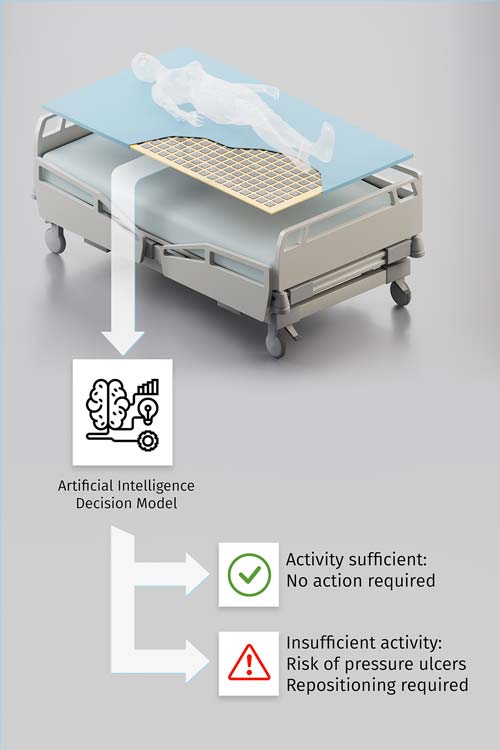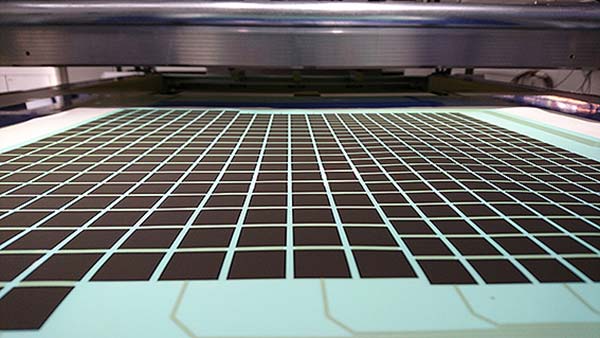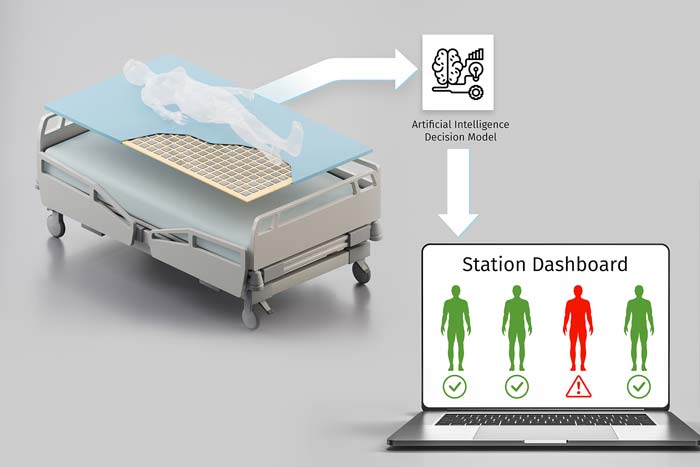 InnovationLab, the expert in printed electronics “from lab to fab,” today demonstrated a smart mattress cover that may reduce by up to 88% the risk of developing decubitus ulcers[i], the potentially life-threatening pressure ulcers that affect up to 2.5 million hospital patients in the U.S. annually[ii]. Combining InnovationLab’s flexible printed sensors with Bitquadrat’s specialized health-monitoring software, the new cost-effective platform conducts personalized, real-time risk-assessment of pressure ulcers—providing the most efficient way to inform nurses and other caregivers when patients require repositioning on their mattress.
InnovationLab, the expert in printed electronics “from lab to fab,” today demonstrated a smart mattress cover that may reduce by up to 88% the risk of developing decubitus ulcers[i], the potentially life-threatening pressure ulcers that affect up to 2.5 million hospital patients in the U.S. annually[ii]. Combining InnovationLab’s flexible printed sensors with Bitquadrat’s specialized health-monitoring software, the new cost-effective platform conducts personalized, real-time risk-assessment of pressure ulcers—providing the most efficient way to inform nurses and other caregivers when patients require repositioning on their mattress.
“A significant number of patients worldwide will develop pressure ulcers, and global mortality directly attributable to pressure ulcers is rising by double digits, making this a very serious healthcare issue,” said Dr. Christoph Kaiser, head of Tech-2-Market department, InnovationLab. “As a designer and manufacturer of roll-to-roll printed and organic sensors, we identified a market need where our technology can help—and then we decided to pursue it. With our ability to mass-produce high-accuracy large-area printed pressure sensors and Bitquadrat’s market-specific expertise in intelligent healthcare software, we can now deliver a cost-effective integrated hardware/software platform that vastly improves real-time monitoring of patients susceptible to developing pressure ulcers. Suppliers to hospitals and senior living facilities—as well as mattress companies and system integrators—can use our solution to build a new generation of smart mattress that will improve the experience of patients by empowering caregivers to provide better care through better technology.”
The smart mattress-cover demonstrator features an array of several hundred flexible printed pressure sensors from InnovationLab integrated with health-monitoring software from Bitquadrat, which leverages machine learning (ML)/artificial intelligence (AI) and real-time data processing. The smart mattress cover assesses the risk of pressure ulcers by monitoring the size and duration of pressure at each point of contact. This is a major advantage over smart mattresses that use motion sensors, which only detect when a patient moves and changes position but cannot detect the size or duration of pressure on the mattress.
 Advantages of the Smart Mattress Demonstrator
Advantages of the Smart Mattress Demonstrator
- Reduces the incidence of pressure ulcers—promoting better care in an acute-care setting to improve the patient’s experience
- Allows caregivers to monitor patients remotely in real-time instead of requiring them to examine a patient’s entire body for pressure ulcers every thirty minutes to two hours—improving efficiency and saving personnel costs
 By using local AI models and on-board computation no sensitive data leaves the device. Only critical alerts are relayed, providing patient monitoring around the clock while preserving privacy.
By using local AI models and on-board computation no sensitive data leaves the device. Only critical alerts are relayed, providing patient monitoring around the clock while preserving privacy.- Reduced incidence of pressure ulcers leads to decreased risk of costly lawsuits against healthcare professionals.
- Environmentally friendly disposable product thanks to organic electronics
“As a software firm deeply committed to a radical paradigm shift in the healthcare industry, Bitquadrat’s focus is to keep people healthier for longer, reducing the time they are ill to improve their quality of life,” said Andreas R. C. Diehl, managing director, Bitquadrat GmbH. “The smart mattress demonstrator exemplifies our philosophy. Combining pressure sensors with real-time health-monitoring software that leverages AI/ML for data processing, we’re now able to open up previously unimagined possibilities for the prevention of decubitus and other serious illnesses. And while the well-being of patients outweighs all other objectives, there’s also an economic benefit to preventing pressure ulcers because for every ulcer avoided, insurance companies can save tens of thousands of dollars. We’re delighted to collaborate with InnovationLab on this important project.”
[i] Walia GS, Wong AL, Lo AY, et al. Efficacy of monitoring devices in support of prevention of pressure injuries: systematic review and meta-analysis. Adv Skin Wound Care 2016;29:567–74.
[ii] https://www.ahrq.gov/patient-safety/settings/hospital/resource/pressureulcer/tool/pu1.html


